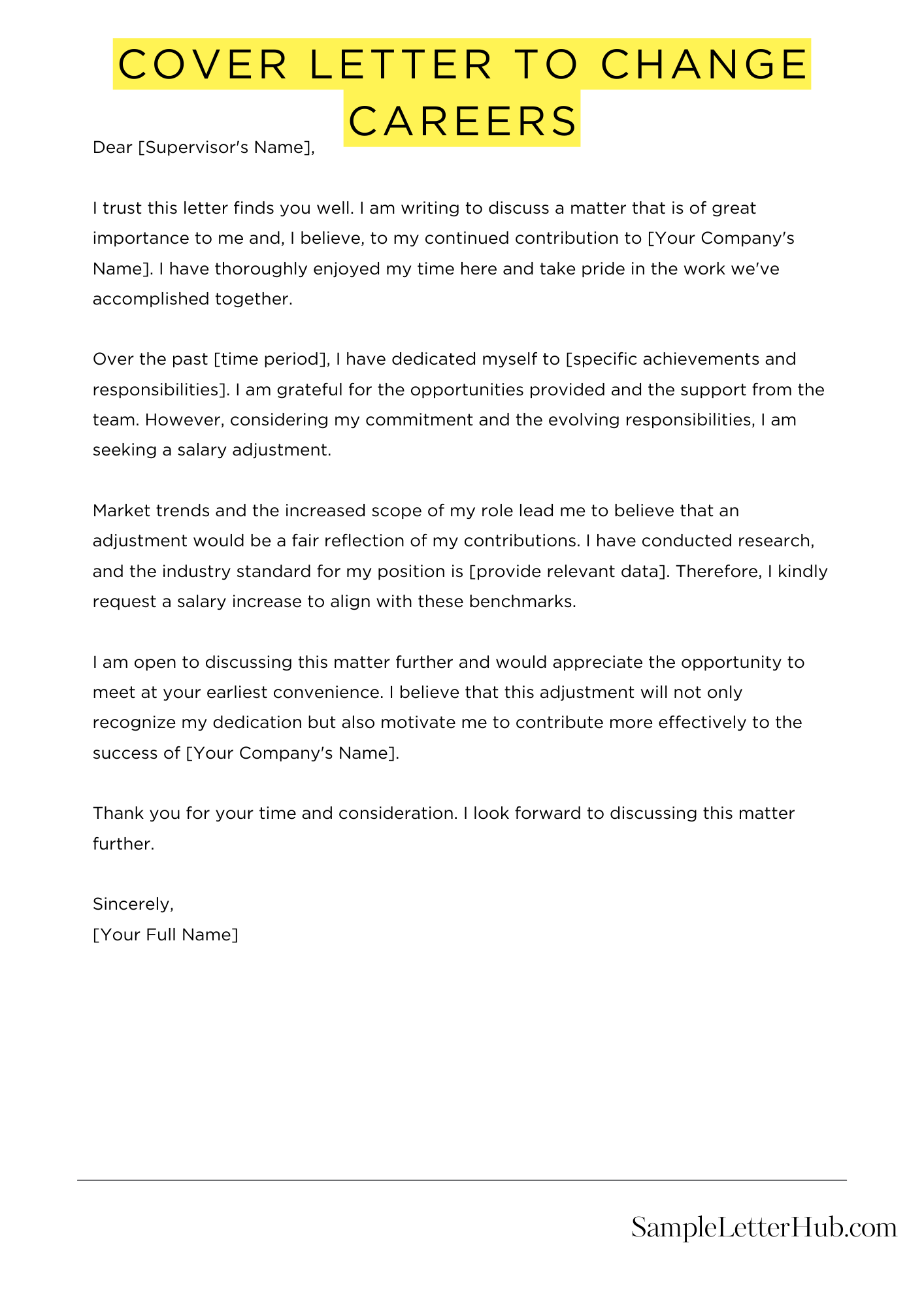A cover letter to change careers is a letter that you write to introduce yourself to a potential employer when you are applying for a job in a different field than the one you have been working in. The purpose of this letter is to convince the employer that you have the skills and experience necessary to be successful in the new role, even though you do not have direct experience in that field.
In this article, we will share some templates, examples, and samples of cover letters to change careers. These letters will provide you with a starting point for writing your own letter, and they will help you to highlight your skills and experience in a way that will make you stand out from other candidates.
We hope that these resources will be helpful to you as you search for a new job in a different field.
Cover Letter for Career Change
Dear Hiring Manager,
I am writing to express my keen interest in the [Position Name] position at [Company Name]. With my proven track record in [Previous Industry] and my transferable skills, I am confident that I can make a valuable contribution to your team.
Throughout my career, I have consistently exceeded expectations in [Previous Role]. I possess a strong foundation in [Relevant Skills], which I have successfully applied in [Previous Projects]. I am also proficient in [Additional Skills], which are essential for the [Position Name] role.
I am eager to leverage my expertise in [Previous Industry] to a new challenge in [New Industry]. I am particularly drawn to [Company Name]’s commitment to [Company Values]. I believe that my passion for [New Industry] and my ability to quickly adapt to new environments would make me a valuable asset to your organization.
I am a highly motivated and results-oriented individual with a strong work ethic. I am confident that I can quickly learn the necessary technical skills and industry knowledge to excel in this role. I am also an effective communicator and team player, with a proven ability to build strong relationships.
I am available for an interview at your earliest convenience. I would welcome the opportunity to discuss my qualifications further and demonstrate how I can contribute to the success of [Company Name].
Thank you for your time and consideration.
Sincerely,
[Your Signature]

How to Write a Cover Letter to Change Careers
Changing careers can be a daunting task, but it’s one that can be made easier with a well-written cover letter. A cover letter is your chance to introduce yourself to a potential employer and explain why you’re the right person for the job. It’s also your chance to show off your skills and experience, and to explain how they can be transferred to your new career.
1. Start with a strong opening paragraph
Your opening paragraph is your chance to make a good first impression, so make sure it’s strong. Start with a hook that will grab the reader’s attention, and then briefly introduce yourself and your career goals. For example, you could start with something like this:
I am writing to express my interest in the [position] position at [company]. I have been working in the [industry] industry for [number] years, and I am eager to transition to a new career in [new industry].
2. Highlight your transferable skills
In your second paragraph, you should highlight your transferable skills. These are the skills that you can use in any job, regardless of your industry. For example, if you’re a marketing professional, you might have transferable skills in writing, communication, and project management. If you’re a teacher, you might have transferable skills in leadership, teamwork, and problem-solving.
When you’re highlighting your transferable skills, be sure to use specific examples. For example, you could say something like this:
In my previous role as a marketing manager, I was responsible for developing and executing marketing campaigns that resulted in a [percentage] increase in sales. I also have experience in writing and editing marketing materials, and I am proficient in using a variety of software programs.
3. Explain how your skills can be applied to the new career
In your third paragraph, you should explain how your skills can be applied to the new career you’re seeking. For example, if you’re a marketing professional who is looking to transition to a career in sales, you could say something like this:
My skills in writing, communication, and project management would be a valuable asset to your sales team. I am confident that I can use my experience to develop and execute sales strategies that will help your company achieve its goals.
4. Show your passion for the new career
In your fourth paragraph, you should show your passion for the new career you’re seeking. This is your chance to explain why you’re interested in the job and why you think you’re the right person for it. For example, you could say something like this:
I have always been passionate about sales, and I am eager to learn more about the industry. I am confident that I have the skills and the drive to be successful in this role, and I am excited to contribute to the success of your company.
5. Close with a strong call to action
Your closing paragraph should be a strong call to action. This is your chance to tell the reader what you want them to do, such as schedule an interview or visit your website. For example, you could say something like this:
I am available for an interview at your earliest convenience. I look forward to hearing from you soon.
6. Proofread your cover letter carefully
Before you submit your cover letter, be sure to proofread it carefully for any errors. This includes checking for typos, grammatical errors, and formatting errors. You should also have someone else read over your cover letter to get feedback.
7. Submit your cover letter with confidence
Once you’re satisfied with your cover letter, submit it with confidence. Be sure to follow the instructions on the job posting, and don’t be afraid to reach out to the hiring manager if you have any questions.
Changing careers can be a challenge, but it’s one that can be overcome with a well-written cover letter. By following these tips, you can write a cover letter that will help you stand out from the competition and land the job you want.
FAQs about Cover Letter To Change Careers
1. How do I highlight my transferable skills in a cover letter for a career change?
Emphasize skills that are relevant to the new role, even if they were gained in a different industry. Use specific examples to demonstrate how your past experiences have equipped you with the necessary abilities.
2. Should I include a career objective statement in my cover letter?
Yes, a career objective statement can be beneficial, especially when changing careers. It allows you to clearly state your career goals and how the position aligns with them.
3. How do I address the lack of direct experience in my cover letter?
Acknowledge the lack of direct experience and focus on your transferable skills and enthusiasm for the new field. Highlight your willingness to learn and your adaptability to new challenges.
4. Should I use a different format for a cover letter for a career change?
While the standard cover letter format is generally acceptable, you can consider using a more creative approach to showcase your unique skills and passion for the new career.
5. How long should my cover letter be for a career change?
Keep your cover letter concise, typically around 250-400 words. Focus on highlighting your most relevant skills and experiences, and tailor it specifically to each job application.

